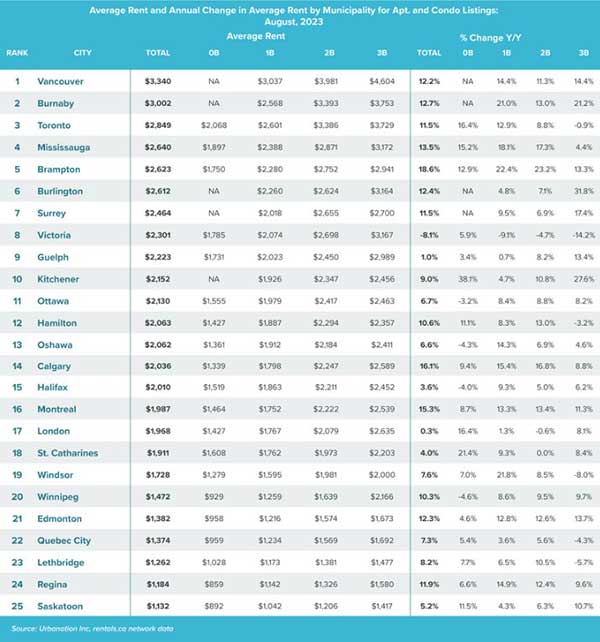A perfect storm of factors driving Canadian rents to new highs
Canada’s rental market hit an all-time high in July, with the average asking rent reaching $2,078, showing an 8.9 percent spike year-on-year, according to the latest National Rent Report by Rentals.ca and Urbanation. This surge was further accentuated by a 1.8 percent growth from June, the steepest monthly jump in eight months.
In a year-over-year comparison, Canadian rents rose by a staggering 21 percent, meaning renters are now shelling out an additional $354 each month. This sharp increase is attributed to a range of factors, such as the influx of post-secondary students seeking housing for the upcoming term, a spike in the general population, and potential homebuyers taking a step back due to the Bank of Canada’s 22-year record interest rate hike.

Shaun Hildebrand
“Canada’s rental market is currently facing a perfect storm of factors driving rents to new highs,” said Shaun Hildebrand, president of Urbanation. “These include the peak season for lease activity, an open border policy for new residents, quickly rising incomes, and the worst ever homeownership affordability conditions.”
Breaking down the numbers further, rents for purpose-built condos and apartments surpassed the $2,000 threshold for the first time, landing at $2,008 in July. Leading the pack were one-bedroom apartments, with an impressive 13 percent annual uptick and a 2.5 percent monthly surge. On average, studios, one-bedroom, two-bedroom, and three-bedroom units were priced at $1,445, $1,850, $2,191, and $2,413, respectively.
City-wise, Calgary stood out with a whopping 16.1 percent annual rise to $2,036, followed closely by Montreal at 15.3 percent, resulting in an average rent of $1,987. Meanwhile, Toronto and Vancouver witnessed slower growth but still commanded hefty average rents of $2,849 and $3,340 respectively.
Focusing on mid-sized markets, Greater Montreal’s Laval and Cote Saint-Luc witnessed significant growth, with 28.5 percent and 23 percent respectively. In B.C., Richmond and New Westminster took the lead, showing 27 percent and 20.7 percent growth. Ontario’s frontrunners were Brampton and Scarborough, each showcasing 18.6 percent and 18.2 percent hikes.
Additionally, roommate accommodations also saw a marked rise across provinces. B.C., Alberta, Ontario, and Quebec averaged a combined 16.1 percent growth in roommate rents, which now averages $971. Quebec led the group with 23.8 percent growth, while B.C. followed at 20.4 percent. Meanwhile, Vancouver and Toronto clinched the highest roommate rents at $1,455 and $1,296.
Municipal overview
| Troy Media
The opinions expressed by our columnists and contributors are theirs alone and do not inherently or expressly reflect the views of our publication.
© Troy Media
Troy Media is an editorial content provider to media outlets and its own hosted community news outlets across Canada.



